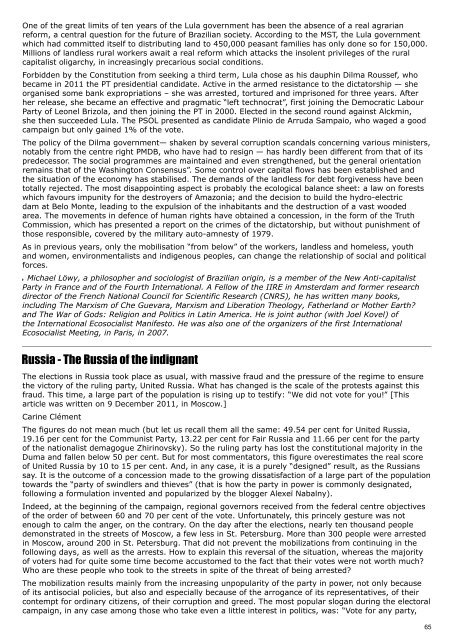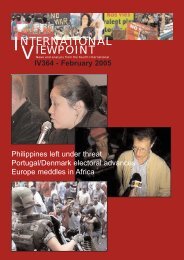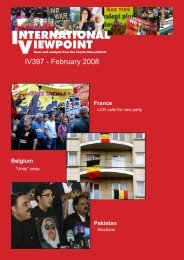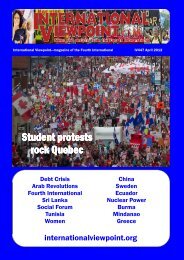download - International Viewpoint
download - International Viewpoint
download - International Viewpoint
You also want an ePaper? Increase the reach of your titles
YUMPU automatically turns print PDFs into web optimized ePapers that Google loves.
One of the great limits of ten years of the Lula government has been the absence of a real agrarian<br />
reform, a central question for the future of Brazilian society. According to the MST, the Lula government<br />
which had committed itself to distributing land to 450,000 peasant families has only done so for 150,000.<br />
Millions of landless rural workers await a real reform which attacks the insolent privileges of the rural<br />
capitalist oligarchy, in increasingly precarious social conditions.<br />
Forbidden by the Constitution from seeking a third term, Lula chose as his dauphin Dilma Roussef, who<br />
became in 2011 the PT presidential candidate. Active in the armed resistance to the dictatorship — she<br />
organised some bank expropriations – she was arrested, tortured and imprisoned for three years. After<br />
her release, she became an effective and pragmatic “left technocrat”, first joining the Democratic Labour<br />
Party of Leonel Brizola, and then joining the PT in 2000. Elected in the second round against Alckmin,<br />
she then succeeded Lula. The PSOL presented as candidate Plinio de Arruda Sampaio, who waged a good<br />
campaign but only gained 1% of the vote.<br />
The policy of the Dilma government— shaken by several corruption scandals concerning various ministers,<br />
notably from the centre right PMDB, who have had to resign — has hardly been different from that of its<br />
predecessor. The social programmes are maintained and even strengthened, but the general orientation<br />
remains that of the Washington Consensus”. Some control over capital flows has been established and<br />
the situation of the economy has stabilised. The demands of the landless for debt forgiveness have been<br />
totally rejected. The most disappointing aspect is probably the ecological balance sheet: a law on forests<br />
which favours impunity for the destroyers of Amazonia; and the decision to build the hydro-electric<br />
dam at Belo Monte, leading to the expulsion of the inhabitants and the destruction of a vast wooded<br />
area. The movements in defence of human rights have obtained a concession, in the form of the Truth<br />
Commission, which has presented a report on the crimes of the dictatorship, but without punishment of<br />
those responsible, covered by the military auto-amnesty of 1979.<br />
As in previous years, only the mobilisation “from below” of the workers, landless and homeless, youth<br />
and women, environmentalists and indigenous peoples, can change the relationship of social and political<br />
forces.<br />
Michael Löwy, a philosopher and sociologist of Brazilian origin, is a member of the New Anti-capitalist<br />
Party in France and of the Fourth <strong>International</strong>. A Fellow of the IIRE in Amsterdam and former research<br />
director of the French National Council for Scientific Research (CNRS), he has written many books,<br />
including The Marxism of Che Guevara, Marxism and Liberation Theology, Fatherland or Mother Earth?<br />
and The War of Gods: Religion and Politics in Latin America. He is joint author (with Joel Kovel) of<br />
the <strong>International</strong> Ecosocialist Manifesto. He was also one of the organizers of the first <strong>International</strong><br />
Ecosocialist Meeting, in Paris, in 2007.<br />
Russia - The Russia of the indignant<br />
The elections in Russia took place as usual, with massive fraud and the pressure of the regime to ensure<br />
the victory of the ruling party, United Russia. What has changed is the scale of the protests against this<br />
fraud. This time, a large part of the population is rising up to testify: “We did not vote for you!” [This<br />
article was written on 9 December 2011, in Moscow.]<br />
Carine Clément<br />
The figures do not mean much (but let us recall them all the same: 49.54 per cent for United Russia,<br />
19.16 per cent for the Communist Party, 13.22 per cent for Fair Russia and 11.66 per cent for the party<br />
of the nationalist demagogue Zhirinovsky). So the ruling party has lost the constitutional majority in the<br />
Duma and fallen below 50 per cent. But for most commentators, this figure overestimates the real score<br />
of United Russia by 10 to 15 per cent. And, in any case, it is a purely “designed” result, as the Russians<br />
say. It is the outcome of a concession made to the growing dissatisfaction of a large part of the population<br />
towards the “party of swindlers and thieves” (that is how the party in power is commonly designated,<br />
following a formulation invented and popularized by the blogger Alexeï Nabalny).<br />
Indeed, at the beginning of the campaign, regional governors received from the federal centre objectives<br />
of the order of between 60 and 70 per cent of the vote. Unfortunately, this princely gesture was not<br />
enough to calm the anger, on the contrary. On the day after the elections, nearly ten thousand people<br />
demonstrated in the streets of Moscow, a few less in St. Petersburg. More than 300 people were arrested<br />
in Moscow, around 200 in St. Petersburg. That did not prevent the mobilizations from continuing in the<br />
following days, as well as the arrests. How to explain this reversal of the situation, whereas the majority<br />
of voters had for quite some time become accustomed to the fact that their votes were not worth much?<br />
Who are these people who took to the streets in spite of the threat of being arrested?<br />
The mobilization results mainly from the increasing unpopularity of the party in power, not only because<br />
of its antisocial policies, but also and especially because of the arrogance of its representatives, of their<br />
contempt for ordinary citizens, of their corruption and greed. The most popular slogan during the electoral<br />
campaign, in any case among those who take even a little interest in politics, was: “Vote for any party,<br />
65









